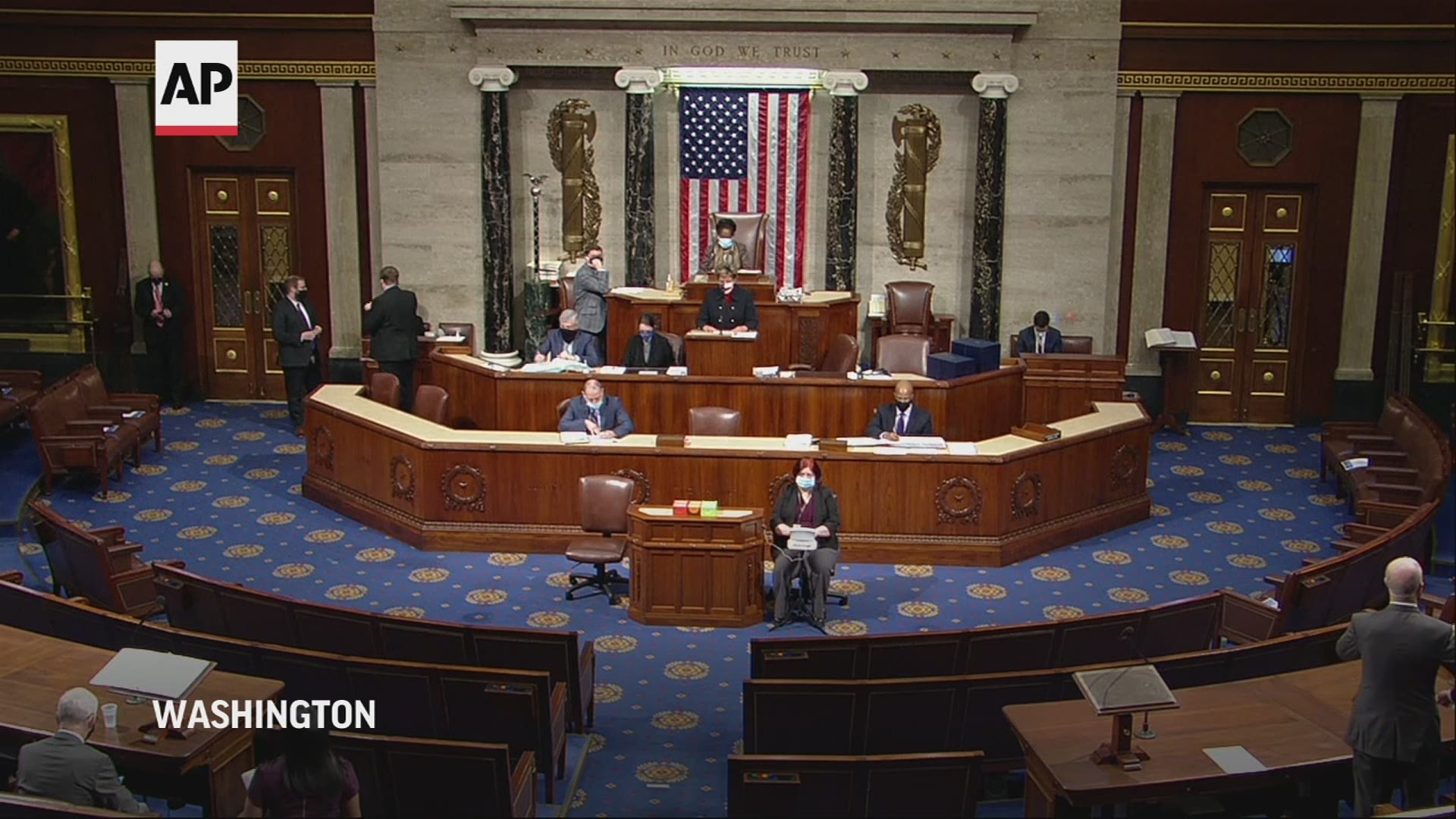WASHINGTON — Congress is ending a chaotic session like few others, a two-year political firestorm that started with the longest federal government shutdown in U.S. history, was riven by impeachment and a pandemic, and now closes with a rare rebuff by Republicans of President Donald Trump.
In the few days remaining, GOP senators are ignoring Trump's demand to increase COVID-19 aid checks to $2,000 and poised to override his veto of a major defense bill, asserting traditional Republican spending and security priorities in defiance of a president who has marched the party in a different direction.
Sen. Lindsey Graham, R-S.C., a top Trump ally, tried to bridge the divide Thursday, saying that Congress could try again to approve Trump's push for bigger COVID aid checks in the new session, which opens Sunday.
"I am with President Trump on this," Graham said on Fox News.
"Our economy is really hurting here," he said. "There's no way to get a vote by Jan. 3. The new Congress begins noon Jan. 3. So the new Congress, you could get a vote.''
As Congress meets for a rare New Year's Eve session, the standoff over the COVID checks and the defense bill punctuates the president's final days. The one-two rebuke of his demands deepens the divide between the Republican Party's new wing of Trump-styled populists and what had been mainstay conservative views.
The stalemate is expected to drag into the weekend.
An exasperated Senate Democratic leader Chuck Schumer said this week, "After all the insanity that Senate Republicans have tolerated from President Trump — his attacks on the rule of law, an independent judiciary, the conduct that led to his impeachment — is this where Senate Republicans are going to draw the line — $2,000 checks to the American people?"
Senate Majority Leader Mitch McConnell all but shut the door on Trump's push for the $2,000 checks, declaring Congress has provided enough pandemic aid as he blocked Democratic attempts to force a vote.
Opening the Senate on Thursday, McConnell called the House-passed bill matching Trump's request "socialism for rich people."
The GOP leader made clear he is unwilling to budge, despite political pressure from Trump and even fellow Republicans, including the two GOP senators facing runoff elections in Georgia next week that will determine which party controls the Senate.
Trump was making an early return to the White House from his private club in Florida. But rather than take a victory lap over the massive $2 trillion-plus COVID aid and year-end spending package he just signed into law — or other successes this session like the confirmation of Amy Coney Barrett to the Supreme Court — he was berating Republican leaders.
The outgoing president appeared more focused on gathering GOP support for his extraordinary challenge of President-elect Joe Biden's win when the Electoral College vote is tallied in a joint session of Congress on Jan. 6.
Most GOP senators seemed to accept the inaction on the relief checks, even as a growing number of Republicans agree with Trump's demand, some wary of bucking him.
With the Georgia Senate runoff elections days away, leading Republicans have warned that the GOP's refusal to provide more aid as the virus worsens could jeopardize the outcome of those races.
Georgia's GOP Sens. David Perdue and Kelly Loeffler, who are trying to fend off Democrats Jon Ossoff and Raphael Warnock in Tuesday's elections, have announced their support for Trump's call for more generous checks.
On Wednesday, McConnell unveiled a new bill loaded up with Trump's other priorities as a possible off-ramp for the stalemate. It included the $2,000 checks more narrowly targeted to lower-income households as well as a complicated repeal of protections for tech companies like Facebook or Twitter under Section 230 of a communications law that the president complained is unfair to conservatives. It also tacked on the establishment of a bipartisan commission to review the 2020 presidential election Trump lost to Biden.
If McConnell set a vote on his bill, it could revive Trump's priorities. But because the approach contains the additional tech and elections provisions, Democrats and some Republicans would likely balk and it would be unlikely to have enough support in Congress to pass.
Liberal senators, led by Bernie Sanders of Vermont, who support the relief boost are blocking action on the defense bill until a vote can be taken on Trump's demand for $2,000 for most Americans.
Republican Sens. Josh Hawley of Missouri and Marco Rubio of Florida, among the party's potential 2024 presidential hopefuls, also pushed in the president's direction for more aid.
Hawley is leading Trump's challenge to the Electoral College result tally in Congress. But he was rebuked Thursday by Sen. Ben Sasse, who warned colleagues off what he called a "dangerous ploy" that could damage trust in elections.
Other Republicans panned the bigger checks, arguing during a lively Senate debate that the nearly $400 billion price tag was too high, the relief was not targeted to those in need and Washington has already dispatched ample sums of COVID-19 aid.
Sen. Pat Toomey, R-Pa., tweeted that "blindly borrowing" billions "so we can send $2,000 checks to millions of people who haven't lost any income is terrible policy."
Considered a longshot, Trump's demand gained momentum at the start of the week when dozens of House Republicans helped pass a bill raising the payments with a robust two-thirds vote of approval.
Americans earning up to $75,000 will qualify for the direct $600 payments, which are phased out at higher income levels, and there's an additional $600 payment per dependent child. Treasury Secretary Steven Mnuchin said the checks were starting to go out this week.

